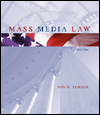
|  |
Updates| Chapter 2, pages 56-57
In May of 2002, the 9th U.S. Court of Appeals, in an en banc ruling, reinstated the $109 million judgment against the American Coalition of Life Activists that had been overturned a year earlier by a three judge panel. In a 6 to 5 ruling, the court said the advocates' posters and Web site went beyond "political hyperbole" to constitute a "personally targeted" threat of violence. The court said that while the Brandenburg standard supports the proposition that advocating violence is protected, threatening a person with violence is not. The court noted that three abortion providers had been murdered after similar wanted posters had been circulated regarding them. These kind of posters had acquired a currency as a death threat for abortion providers, the court said. "They connote something they do not literally say, yet both the actor and the recipient get the message." Planned Parenthood of the Columbia/Willamette Inc. v. American Coalition of Life Activists, 9th Circ. (en banc), No. 99-35320, 5/16/02. Chapter 3, pages 109-09
In mid-June of 2002 the Supreme Court of the United States re-asserted a long-standing First Amendment principle that people have the right to go door to door to advocate for political or religious or other non commercial causes without first getting the permission of the government in the community in which they are soliciting. The 8-1 ruling struck down a Stratton, Ohio ordinance that made it a crime to undertake such solicitation without first obtaining a permit from the mayor's office.
The case, Watchtower Bible & Tract Society v. Village of Stratton (U.S. No. 00-1737, 6/18/02), was brought by the Jehovah's Witnesses, a religious organization that has been fighting such laws for more than 75 years. Justice John Paul Stevens said the ordinance was "offensive, not only to the values protected by the first amendment, but to the very notion of free society." The court found it repugnant that before a citizen could engage in discourse in his or her community, he or she had to inform the government of his or her desire to speak with neighbors, and then get a permit to do so.
This issue had been litigated more than 60 years ago. The interesting aspect of the 2002 ruling is that when these cases came to the courts in the 1930s and 1940s, the right to privacy, a key element the community used to support its law, had far less public support or legal meaning than it has today. Nevertheless, the high court still ruled that freedom of expression trumped the residents' right to be let alone.Chapter 13, page 455
In May 2002, the Supreme Court of the United States reversed a 9th U.S. Court of Appeals decision that voided the Los Angeles ordinance that prohibited two adult businesses, such as book stores and a video arcade, from being in the same building. The lower court ruled that the city had failed to provide the necessary evidence of harmful secondary effects to sustain the ordinance. The high court ruled 5 to 4 that the evidence presented by the city was sufficient to withstand a summary judgment and a trial court should reexamine the question in a full trial. Los Angeles v. Alameda Books, Inc., U.S. No. 00-799, 5/13/02. Chapter 13, pages 461-62
In May of 2002, the Supreme Court of the United States reversed a lower court ruling that the Child Online Protection Act of 1998 was unconstitutional because it uses the community standards test from Miller v. California, a test that is supposed to reflect local or state standards, to measure content on the Internet, a national (indeed, international) communications system. The Court of Appeals ruling had invalidated the statute solely on the grounds that it was overbroad in using this test. The lower court said this was such an obvious flaw that it was unnecessary to examine the rest of the law. The high court disagreed.
But the fate of the law is still up in the air. The court continued in affect a lower court order blocking the enforcement of the law and told the lower court to reexamine all aspects of the measure. It is very likely the high court will see the issue again after the next lower court ruling. Ashcroft v. American Civil Liberties Union, U.S. No. 00-1293, 5/13/02.
Chapter 14, page 492
The Margaret Mitchell estate agreed in May of 2002 to settle its copyright dispute with the Houghton Mifflin Company over the publication of The Wind Done Gone. Details of the settlement were not released, but the book will continue to be published, labeled as an "unauthorized parody." |
|
|